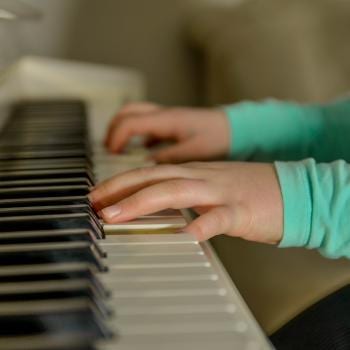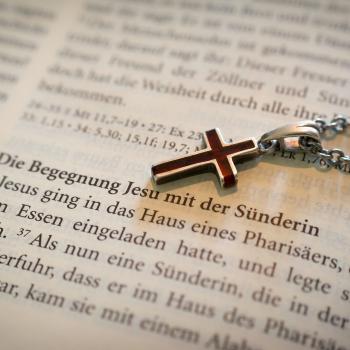I recently came upon an article titled Motherhood: The Strongest Bond. For whatever reason, the article title was later changed to The Most Powerful Thing You Can Say to Another Mom. The basic idea is that we who are mothers are united in a powerful way by our love for our children and our willingness to sacrifice for them, and that that gives us a common sense of understanding for each other.
Here’s an excerpt from the article:
. . .
And later I was getting dinner at a takeout restaurant, and one of the employees was on the phone in the restroom. She was struggling to find a babysitter for her child while she finished her late shift. She was frantic. She was upset. She was mad. My heart skipped another beat, and the tears welled up in my eyes once again.
I know, I’m a mom.
. . .
And on the plane on the ride home there was a new mom standing with her infant son nearly the whole four-and-a-half-hour flight because if she attempted to sit down, he wailed. She looked exhausted and frustrated. She checked her watch frequently, but she also kept on task all while kissing on his little bald head.
I know, I’m a mom.
See, it’s a thread that unites us all. . . .
. . .
It’s also why we should always provide a blanket of support to all fellow moms. Not only to those who are suffering through the unimaginable pain of losing a child, but also to those mamas going through plain ol’ rough times . . . and even those moms who are just having one of those days. Hug her, and if you are struggling to find the right words, all you may really need to say is, “I know, I’m a mom.”
I definitely get this. There are plenty of times when I see a mom looking frazzled or exhausted and feel immediate sympathy and a sort of bond. Parenting is hard. I’ve been the mom with the child begging for their favorite snack food in the grocery, and the mom who has to take their kid out of the restaurant when it gets to be too much for them. Sometimes a sympathetic look can mean the world.
But the thing is, I’ve also been a child.
This article isn’t the first time I’ve seen this idea that mothers have a sort of common bond and understanding. I have to wonder—why do we so rarely extend that same sense of understanding to children? I sometimes feel like 95% of adults have forgotten what it felt like to be a child. So yes, when I see a mom struggling to get through the grocery store with a child in tow, I identify with her—but I also identify with her child.
Somehow I never lost the ability to see the world the way a child sees it. When I first started parenting, I planned to parent the way my parents did, relying on rules and corporal punishment. I began punishing my daughter for disobedience when she was only 10 months old—she was old enough to understand the word “no,” I reasoned. This all changed the moment I tried to get inside of her head and see the world from her perspective. Everything about my parenting changed that moment.
Being a child is extremely difficult. Very small children don’t have full control over their own bodies, and everything in their homes is scaled up in size, designed for adults. Try imagining what it would be like to live in a house built for giants for a moment—a house where your head doesn’t even come up to the sink, and getting into a chair is a bit like going rock climbing. Now imagine that you can’t access food yourself, and instead have to ask the giants you live with to get you food when you’re hungry—and a drink when you’re thirsty.
For young children, there’s also a language barrier. Imagine for a moment that you’re in a foreign country with no guidebook, and that you have to somehow communicate what you need, where you want to go, and how you’re feeling. Sometimes—often—you simply won’t know the words to express what it is you want to express.
Children, too, do not get to choose when and where they go—when they go to the grocery, whether they go to the library, all of this is up to their parents. Imagine, for a moment, not having freedom of movement. Imagine having to convince another person—a spouse, perhaps—to take you to a coffee shop, or a book store, rather than simply being able to get up and go.
And this is only the start! Think of computer time—kids frequently have to ask permission to use electronics, and many parents limit their kids’ screen time. There are reasons for this, of course, but imagine having to ask permission to use your computer—or being limited to one hour of use each day. Especially as children grow older and become adolescents, these sorts of rules and limitations start to grate.
Being a child can be extremely trying, but in our society today we focus a lot more about the trials of parenting is than we do about the trials of being a child. Empathizing with parents is great—don’t get me wrong!—but we need to also remember how to empathize with children. This shouldn’t be difficult—while only some of us have been parents, all of us have been children.














